|
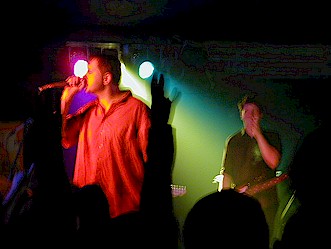
Guided by Voices
Robert Pollard has gone from school to
stage, with an arena in clear view. But if things don't work out, he's not a afraid
to go back to class.
by tim mcmahan
|
|
|
| Photos taken at Guided by Voices
April 8, 2000, appearance at Omaha's Sokol Underground. |
|
|
After 14
years of recording and releasing material, Guided by Voices isn't much closer to 'hitting
the big time' then they were when lead vocalist/writer Robert Pollard was recording music
in his garage with a handful of neighborhood buddies.
And that suits Pollard just fine. "I'm totally happy right now," he said from
his home in Dayton, where he's playing some shows before going on the road again, this
time to support Hold on Hope, a new 9-song EP just released on TVT Records.
"When I started out, people threatened that I'd eventually have to go back to my
teaching job. Good. I don't care," said Pollard, who talks at about a thousand words
a minute with a slight southern draw, a constant reminder that he's still a small-town
guy. "I wouldn't mind having stadium success and I know that we're that good. I'm
just curious as to how far we can make this go. I'm into rock, and it doesn't matter if we
play somebody's party or an arena. The thing is, I'm not obsessed with it, I don't
care." |
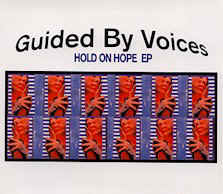
|
|
You could
argue that Pollard already has accomplished more than any other retired fourth-grade
teacher who turned his back on education to play rock and roll. His story has become the
stuff of rock legend: Grade school teacher gets together with friends from a number of
local Dayton bands and jams in his garage, taking it all down on tape. From 1986 through
1993 they put out seven recordings, none of which catch the ear of anyone outside southern
Ohio. Meanwhile, Pollard continues to teach the "three R's" while daydreaming of
stage lights.
After '93's Vampire on Titus was released on Scat, the music insiders began
figuring it out. Following a series of New York shows, Pollard discovered that his band
had begun to attract an interesting group of fans, including The Breeders, Thurston Moore,
Peter Buck, Peter Wolf, Ray Davies and the Beastie Boys.
Then in '94, the year of Kurt Cobain's death and the beginning of the end for grunge,
along came Bee Thousand, Guided By Voices' homemade opus that blew the lid off
Pollard's career, instantly positioning him as an indie rock legend. The album came out of
nowhere and was immediately embraced by the likes of Spin, Rolling Stone, Entertainment
Weekly and just about everyone in the indie rock world. What they discovered was that
Pollard had an uncanny ability to write short, sweet pop songs with hooks that you
couldn't get out of your head. Their crude, 4-track recordings ushered in what would come
to be known as the "low-fi" craze. Suddenly, for better or worse, hiss-filled
CDs that sounded like they were recorded for about $10 in someone's basement
"studio" were all the rage among indie bands. Sounding good meant sounding bad.
The boost from Dayton garage band to underground superstar happened overnight and very
much caught Pollard by surprise.
"We tried purposely for no one to find us," he said. "It's not my
philosophy to promote ourselves; sometimes that can be a put off. If you're good enough,
they'll find you. But I never thought we were good enough."
Despite the instant notoriety, Pollard was still afraid to give up his fourth-grade
classes. "I didn't have the courage to leave the teaching job, I was forced into
it," he said. "We were this critically acclaimed band, heralded as the kings of
low-fi. There really was no way I could say 'no.' For a year I did both jobs, but it was
leading to a nervous breakdown and I had to make a decision."
Stop for a moment and imagine telling your husband or wife that, at the age of 36,
you're going to quit the teaching job you've held for more than a decade to make rock
music.
"It scared my family and friends," Pollard said. "They didn't like when
I played music on the side as a teacher. They'd say stuff like, 'When are you gonna quit
doing that shit?' My response was 'I do it because it's fun, it's my hobby. Why does it
scare you so much?'" |
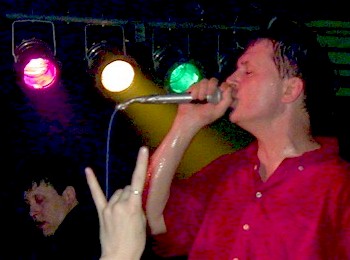
"If you're good enough, they'll find
you. But I never thought we were good enough."
|
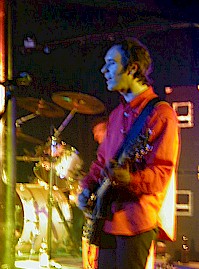
"I'm the only one who's been in the band
the whole time... I'm the mainstay and we'll keep things going."
|
It shouldn't
have, just as his move to full-time rock and roller shouldn't have been a surprise.
Pollard's love of music was evident in his mammoth record collection, lovingly stored in
his basement. And it seems all that old vinyl eventually makes its way into his music.
Take "Interest Position" off Hold on Hope, for instance. Anyone with
even a remote understanding of early '70s rock will immediately recognize the
CSNY/Byrds-style harmonies floating over all those wonderful, crunching guitars.
"We'll do this really Byrdsian harmony over an Amboy Dukes heavy metal music canvas
that creates this sad feeling of big rock," Pollard said. "There's a lot of that
on the next record, as well. My thing always was to take the melodicism of the '60s, which
has never been captured again, and mix it with the heaviness of early '70s metal. I was
into so many different genres growing up -- glam, post-punk, bubblegum and prog."
All of it shows up on Hold on Hope and his previous LP, Do The Collapse,
also released on TVT. Gone are all those hiss-filled tracks that typified his early
recordings, replaced with well-produced, clean, layered rockers. Helping out on the knobs
for both CDs was Cars' frontman Ric Ocasek, who's become the Steve Albini of radio
friendly underground rock.
The band's recording quality isn't the only thing that's changed over the years. More
than 40 people have played in GBV since its inception. Pollard says the current line-up,
which includes Doug Gillard, guitars and backup vocals; Tim Tobias, bass; Jim MacPherson,
drums, Nate Farley, guitar, and Greg Demos is among the best he's ever played with.
Unfortunately after this tour, he'll go through yet another line-up change as MacPherson
just announced that he's leaving the band. Pollard says the constant changes "make
things interesting."
"I want to have one solid line-up, but Jim made a decision," he said.
"He wants to be with his kids and I have to honor and respect that, but I'm still
disappointed. He was a great drummer and has now left me with the task of replacing him.
I'm not going to press it, that's how you make a mistake. We'll get Doug or a session
drummer if we don't have someone by this summer when we go back into the studio.
"I'm the only one who's been in the band the whole time," he added. "I
love this current line-up, and I've loved all the line-ups over the years with the
exception of when I played with Cobra Verde. I'm the mainstay and we'll keep things
going." |
|
|
That is
unless he dies on stage. While researching this story, it seemed every magazine article,
news clip and web story made mention of Pollard's beer consumption, a topic which almost
overshadowed a cover story in last August's Magnet magazine. Pollard says I have
nothing to worry about.
"Our thing with alcohol is kind of like how the Grateful Dead was with acid.
That's why bars love us," he said. "People read about (the beer consumption) and
are concerned that I'm destroying my health completely. I don't drink all the time. I
don't smoke when I'm off stage. I do have will power.
"The only reason I drank on stage initially was because I have stage fright,"
he added. "I thought about giving it up, but heard, 'We'll boo you off the fucking
stage,' so now it's a part of the show. It's our thing, I guess. And the press needs
something to talk about."
Pollard would prefer they talk about rock-and-roll, which has seen its share of changes
over the past 40 years. If GBV's music is a reintroduction to the heavy, melodic stuff of
the '70s, what will the kids of this generation be playing in their bands when they're
Pollard's age? A glance at today's music charts draws a fairly bleak picture, and Pollard
couldn't agree more.
"Today's music is totally lame," he said. "There's nothing listenable,
it's nearly impossible to find a good song. It's all formula. You have to be a part of
three or four different styles of music or you're 'not in.' When I was younger, there were
50 or 60 albums a year that I couldn't wait to be released. Every week there was a new
one. Maybe the reason I don't like today's music is because I'm old and jaded."
He says he doesn't listen to music nearly as much as he used to. "I still go
record shopping, but it's mostly for older stuff," Pollard said. "There's some
good modern stuff, like Those Bastard Souls and The Grifters, but in the old days, the
mainstream was the good stuff."
If anything, the bleak state of today's music is a motivator. "It's another reason
to make it into the arena world," Pollard said. "Not because I want to be
'what's going on,' but because I want to change it back so there's some good music in the
mainstream. There will be someone who will come along and change things. Rock isn't dead,
it's dormant."
Back to 
Published in Omaha Weekly April 6, 2000. Copyright © 2000 Tim
McMahan. All rights reserved.
|
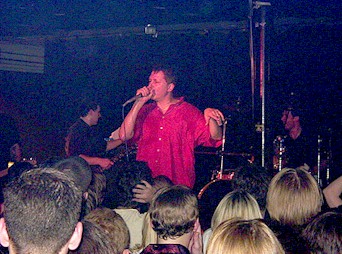
"People read about (the beer
consumption) and are concerned that I'm destroying my health completely."
|
|

![]() webboard
interviews
webboard
interviews